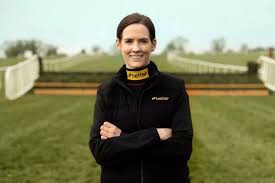Blackmore's Quiet Thunder: What Her Retirement Really Means
Her riding wasn’t flashy. It was fluent. She didn’t chase attention; she gathered it, slowly and with clinical results
HORSE RACINGSPORT
Ed Grimshaw
5/13/20253 min read


Rachael Blackmore didn’t just win races. She reprogrammed expectations. She didn’t enter racing to make a point — but she ended up making several. Some of them historic. All of them undeniable.
This month, after 16 years and 575 winners, Blackmore walked away from the saddle. The news wasn’t leaked or orchestrated. No media trail or documentary tease. Just a dignified end, announced with grace and finality. “I feel so lucky,” she said. It was the kind of statement that only comes from someone who changed a world and left it better than she found it.
The Disruptor Who Didn’t Ask for Permission
She wasn’t bred for the game, at least not in the traditional sense. No bloodstock lineage, no racing academy polish. Just a dairy farmer’s daughter from Killenaule, Tipperary, who showed up, listened hard, and rode harder.
She climbed the ranks quietly. When the top yards didn’t call, she took the outside rides — and brought them home in front. Her riding wasn’t flashy. It was fluent. She didn’t chase attention; she gathered it, slowly and with clinical results. By the time she partnered Minella Times in the 2021 Grand National, she was already the best tactical rider in Ireland — male or female.
That win broke a 182-year-old barrier. But it wasn’t her “moment”. It was a milestone in a campaign of proof. She’d already taken the Champion Hurdle with Honeysuckle. She’d go on to take the Gold Cup with A Plus Tard. She wasn’t proving anyone wrong. She was showing what right looked like.
Henry de Bromhead: The Quiet Architect
No story of Blackmore’s ascent is complete without Henry de Bromhead. Their partnership was one of the great human alignments in modern jump racing. He gave her opportunity; she returned it with precision. No noise. No drama. Just two professionals who understood that performance beats profile every time.
Together they collected major prizes like stamps: Champion Hurdles (2021, 2022), Gold Cup (2022), Mares’ Hurdles, Grade 1s at every major track. Each win etched a new truth into the sport: this wasn’t a token trailblazer. This was the most effective rider-trainer combination since the Walsh-Mullins axis.
Changing the Betting Landscape
Her impact wasn’t just cultural. It was financial. For punters and layers alike, Blackmore represented behavioural change in the market. In the early years, her mounts were regularly overpriced — a clear sign of unconscious bias. Then, as her winners piled up, the market adjusted.
But even then, there was always an edge in her rides. Horses responded. She could find rhythm where others forced pace. She could win from the front, or from last. She didn’t impose her style — she adapted. And that’s why she so often delivered in big fields, at big meetings, under big pressure.
Retirement Without the Fuss
And then, just like that, she was gone.
Her final ride? A winner at Cork aboard Ma Belle Etoile. Not Cheltenham. Not Punchestown. No ceremony. Just a final act of clarity from a jockey who never played to the crowd.
“I’ve had an incredible career,” she said. “I feel so grateful to have had the opportunities I’ve had.”
It’s the kind of retirement statement that resists analysis — because it doesn’t seek it. She leaves with a full tank and a spotless record. No drop-off. No swansong circuit. Just the rarest thing in sport: a career that ends without any need to explain itself.
The Vacuum She Leaves
Here’s where it gets uncomfortable.
Will trainers keep faith with female riders now that the best one’s gone? Or was Blackmore treated as a brilliant anomaly — someone who ticked the diversity box so the system didn’t have to evolve?
Progress is not self-sustaining. It requires structures. Mentors. Pathways. And racing’s old habits don’t die easily. The risk is that the door Blackmore kicked open slowly creaks shut without her there to hold it.
But here’s the counter-argument: she’s done enough. If racing can’t build on her legacy, it’s not her failure. It’s ours.
Final Reflections: The Shape of Greatness
What will we remember?
The silence before the roar at Aintree. The cool urgency on Honeysuckle. The impossible Gold Cup kick from A Plus Tard. Or perhaps the composure — the inner stillness that made even the wildest race feel navigable when she was riding.
We’ll remember the interviews: modest, unspun, deeply Irish. We’ll remember the way owners, trainers, punters — all of us — ran out of excuses to not take her seriously.
We’ll remember that she didn’t ask to be the face of change. She simply made it impossible not to look.
Rachael Blackmore is gone from the saddle. But her signature is everywhere.
She didn’t just win.
She redrew the map.
